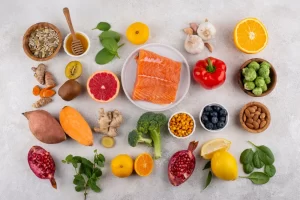 Nutrient-dense foods pack a powerful punch of vitamins, minerals, and other essential nutrients per calorie.
Nutrient-dense foods pack a powerful punch of vitamins, minerals, and other essential nutrients per calorie.
Including these foods in your diet not only supports overall health but also provides a wide range of benefits. These foods provide a diverse array of vitamins, minerals, and other essential nutrients. Eating a variety of nutrient-rich foods supports overall health and contributes to a well-balanced and satisfying diet.
Here are 15 nutrient-dense foods to incorporate into your meals:
1. Kale
Dark Leafy Greens: Kale is a nutritional powerhouse, rich in vitamins A, C, and K, as well as minerals like calcium and potassium. It’s also a great source of antioxidants.
2. Blueberries
Antioxidant-Rich Berries: Blueberries are loaded with antioxidants, particularly anthocyanins. They contribute to cognitive health and may have anti-inflammatory effects.
3. Salmon
Fatty Fish: Salmon is an excellent source of omega-3 fatty acids, essential for heart health. It also provides high-quality protein and various vitamins and minerals.
4. Quinoa
Whole Grains: Quinoa is a complete protein, containing all essential amino acids. It’s also rich in fiber, vitamins, and minerals, making it a nutritious grain alternative.
5. Sweet Potatoes
Vitamin-Rich Tubers: Sweet potatoes are packed with vitamins A and C, fiber, and potassium. Their natural sweetness makes them a versatile and nutritious addition to meals.
6. Broccoli
Cruciferous Vegetables: Broccoli belongs to the cruciferous vegetable family, known for its cancer-fighting properties. It’s a good source of vitamins C, K, and folate.
7. Almonds
Nutrient-Packed Nuts: Almonds are a nutrient-dense snack, providing healthy fats, protein, vitamin E, and minerals like magnesium.
8. Spinach
Versatile Leafy Green: Spinach is rich in iron, vitamins A and K, and folate. It’s a versatile ingredient that can be used in salads, smoothies, or cooked dishes.
9. Avocado
Healthy Fats: Avocado is a source of heart-healthy monounsaturated fats. It also provides potassium, vitamins, and fiber.
10. Eggs
Protein Powerhouse: Eggs are a complete protein source, containing essential amino acids. They also provide vitamins B12 and D.
11. Chia Seeds
Omega-3-Rich Seeds: Chia seeds are packed with omega-3 fatty acids, fiber, and various vitamins and minerals. They can be easily added to smoothies, yogurt, or oatmeal.
12. Lentils
Plant-Based Protein: Lentils are an excellent source of plant-based protein, fiber, and various vitamins and minerals. They are a staple in vegetarian and vegan diets.
13. Oranges
Citrus Fruits: Oranges are rich in vitamin C, an antioxidant that supports immune health. They also provide fiber and hydration.
14. Greek Yogurt
Probiotic-Rich Dairy: Greek yogurt is a protein-rich dairy option that also contains probiotics, beneficial for gut health.
15. Pumpkin Seeds
Mineral-Rich Seeds: Pumpkin seeds are a good source of magnesium, zinc, and iron. They can be enjoyed as a snack or added to salads and granola.
Picture Credit: Freepik
